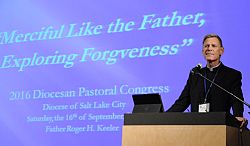Focus on forgiveness at Pastoral Congress
Friday, Sep. 23, 2016

IC photo/Marie Mischel
+ Enlarge
Father Roger Keeler gives the keynote address in English at the 2016 Diocese of Salt Lake City Pastoral Congress; he focused on the theme of forgiveness.
DRAPER — More than 600 people from throughout the Diocese of Salt Lake City gathered at the Skaggs Catholic Center Sept. 17 for the 2016 Pastoral Congress, which had the theme of “Exploring Forgiveness.”
“It’s such a wonderful event – a renewing time,” said Monsignor Colin F. Bircumshaw, diocesan administrator, as he welcomed participants during the day’s Mass.
The congress offered dozens of workshops in English and Spanish on a variety of topics, many of which focused on some aspect of forgiveness.
“I think overall people really had the opportunity to celebrate the Year of Mercy together by this day of prayer and study, and experience probing into forgiveness, both of forgiving self and forgiving others,” said Susan Northway, the diocesan director of religious education, who coordinated the congress.
The keynote speaker in English was Father Roger Keeler, JCD, Ph.D., executive director of the Canon Law Society of America and an assistant professor at the Oblate School of Theology.
Fr. Keeler also was the homilist at the Mass. In his homily, he reflected on the Gospel reading, which was on the Parable of the Sower.
In that parable, Jesus is saying “when that seed falls into a receptive, good, generous heart, something wondrous happens there without the one who receives it knowing it or wanting it,” Fr. Keeler said. “It miraculously bears fruit. How? By grace. Why? Because God wants it. With who? Anybody who encounters it.”
Miraculous things happen when one is open to God’s word, Fr. Keeler added, and he urged those present to be receptive to God’s mercy, love and goodness so that they might bring others into the “eternal embrace that God intends for all God’s children, for all his creatures.”
During the keynote address, Fr. Keeler spoke of what forgiveness is, and what it is not. He attributed much of his content to Pope Francis and also to John Monbourquette’s book How to Forgive: A Step-By-Step Guide.
“Nothing can unite us to God more than an act of mercy, for it is by mercy that the Lord forgives our sins and gives us the grace to practice acts of mercy in his name,” said Fr. Keeler, who told the story of a woman named Kathy, who left an abusive marriage.
With two daughters to support, Kathy returned to school, earned an MBA and a law degree, and became an attorney. Her children grew estranged from her; one worked as a Wall Street executive, the other was an artist.
Fr. Keeler met Kathy in a hospice when she was dying of cancer. She asked him to convince her daughters to see her, which they did only reluctantly. Speaking to them individually, Kathy told the eldest that she saw her own hard-heartedness and ruthlessness in her, and wanted more for her. Then she told the youngest that she was jealous of her because she herself had always wanted to be a free spirit but was unable to because she had to support the family.
The reunion was a powerful healing experience for all three women, Fr. Keeler said; Kathy “died knowing that she was not only forgiven by her daughters, she was forgiven by her god, too.”
Without forgiveness, people stay mired in the past, in perpetual grief and resentment, he said. “Each of us needs to forgive in order to establish peace or re-establish peace and continue living with one another.”
Dispelling several “false notions of forgiveness,” he said that forgiveness is not forgetting, forgiveness doesn’t mean excusing the offender, and that forgiveness takes more than an act of will, it takes time.
While there is a relationship between justice and forgiveness, the two are not synonymous, he said. “Justice concerns itself with re-establishing the rights of an injured party. Forgiveness is primarily the expression of good will given in abundance.”
Forgiveness also doesn’t mean leaving a matter to God alone, because “God doesn’t do for us what it is up to us to do, so forgiveness depends as much upon my action as it does upon God’s grace,” he said.
Forgiveness is a process that takes time and requires perseverance, he said; it is to gift another person “with the affirmation of their human dignity and to stand with them on the common ground of frailty and suffering because we’re all human together, and we all make mistakes. That’s what it means to forgive.”
To achieve true forgiveness, people must decide to not seek revenge, recognize their own inner pain and poverty, accept their anger and desire for revenge, forgive themselves, and start to understand the offender, he said.
“Forgiveness gives us the experience of being recognized and appreciated for who we are. We feel unconditionally loved when we get forgiveness, despite our ugliness, our weakness, our failures, our transgressions, our foibles, our neuroses, our stupidity, our foot-in-the-mouth,” he said.
Fr. Keeler’s keynote address at the Pastoral Congress “touched many people. … I had a number of people say that it put them into tears,” Northway said.
For questions, comments or to report inaccuracies on the website, please CLICK HERE.
© Copyright 2024 The Diocese of Salt Lake City. All rights reserved.
© Copyright 2024 The Diocese of Salt Lake City. All rights reserved.

Stay Connected With Us